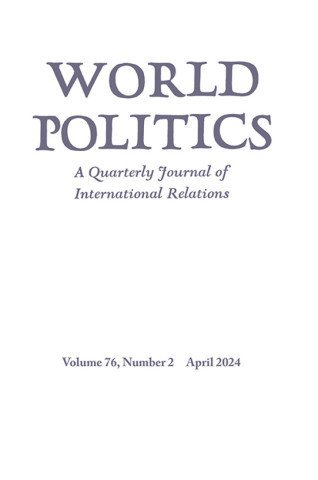重新定义国际安全中关于声誉和信誉的争论
IF 2.5
1区 社会学
Q1 INTERNATIONAL RELATIONS
引用次数: 11
摘要
摘要近年来的学术浪潮为国际政治声誉和可信度研究注入了新的活力。在这篇综述文章中,作者对这一发展表示欢迎,同时提供了一个评估集体进步的框架、一系列相关的批评以及对未来研究的一系列建议。这篇文章详细介绍了正在审查的书籍如何代表着就声誉在世界政治中的重要性达成共识的重要一步,阐明了声誉推断可能最为突出的范围条件。作者认为,尽管最近的研究取得了重大成就,但学术记录对感知者的心理仍然很少,而是以牺牲倾向变量为代价关注情境因素,并且相当狭隘地倾向于以决心排除其他重要类型为声誉。尽管新文学做出了贡献,但它仍然没有充分解释演员是如何推断声誉的。这些剩余的理论挑战需要学术界的关注,并表明心理学在填补一些空白方面发挥了作用。本文章由计算机程序翻译,如有差异,请以英文原文为准。
Redefining the Debate Over Reputation and Credibility in International Security
ABSTRACT A wave of recent scholarship has breathed new life into the study of reputation and credibility in international politics. In this review article, the authors welcome this development while offering a framework for evaluating collective progress, a series of related critiques, and a set of suggestions for future research. The article details how the books under review represent an important step toward consensus on the importance of reputation in world politics, elucidating scope conditions for when reputational inferences are likely to be most salient. The authors argue that despite the significant accomplishments of recent studies, the scholarly record remains thin on the psychology of the perceiver and is instead focused on situational factors at the expense of dispositional variables and is rather myopically oriented toward reputation for resolve to the exclusion of other important types. Despite its contributions, the new literature still falls short of a full explanation for how actors draw inferences about reputation. These remaining theoretical challenges demand scholarly attention and suggest a role for psychology in filling some of the gaps.
求助全文
通过发布文献求助,成功后即可免费获取论文全文。
去求助
来源期刊

World Politics
Multiple-
CiteScore
8.40
自引率
0.00%
发文量
24
期刊介绍:
World Politics, founded in 1948, is an internationally renowned quarterly journal of political science published in both print and online versions. Open to contributions by scholars, World Politics invites submission of research articles that make theoretical and empirical contributions to the literature, review articles, and research notes bearing on problems in international relations and comparative politics. The journal does not publish articles on current affairs, policy pieces, or narratives of a journalistic nature. Articles submitted for consideration are unsolicited, except for review articles, which are usually commissioned. Published for the Princeton Institute for International and Regional Affairs
 求助内容:
求助内容: 应助结果提醒方式:
应助结果提醒方式:


